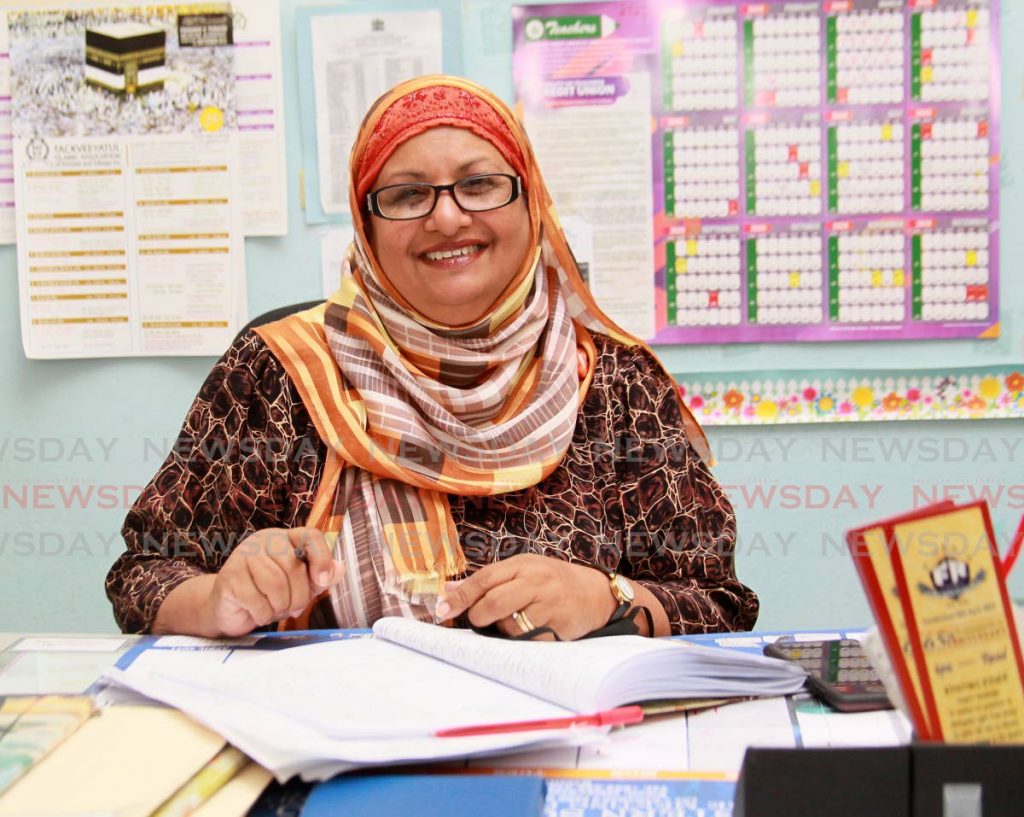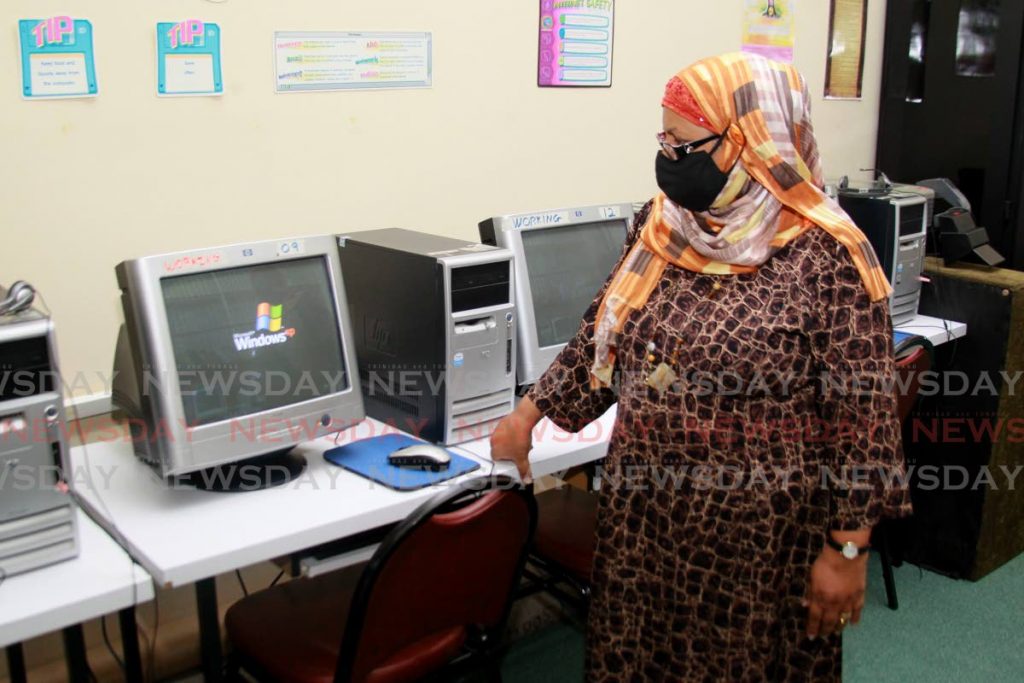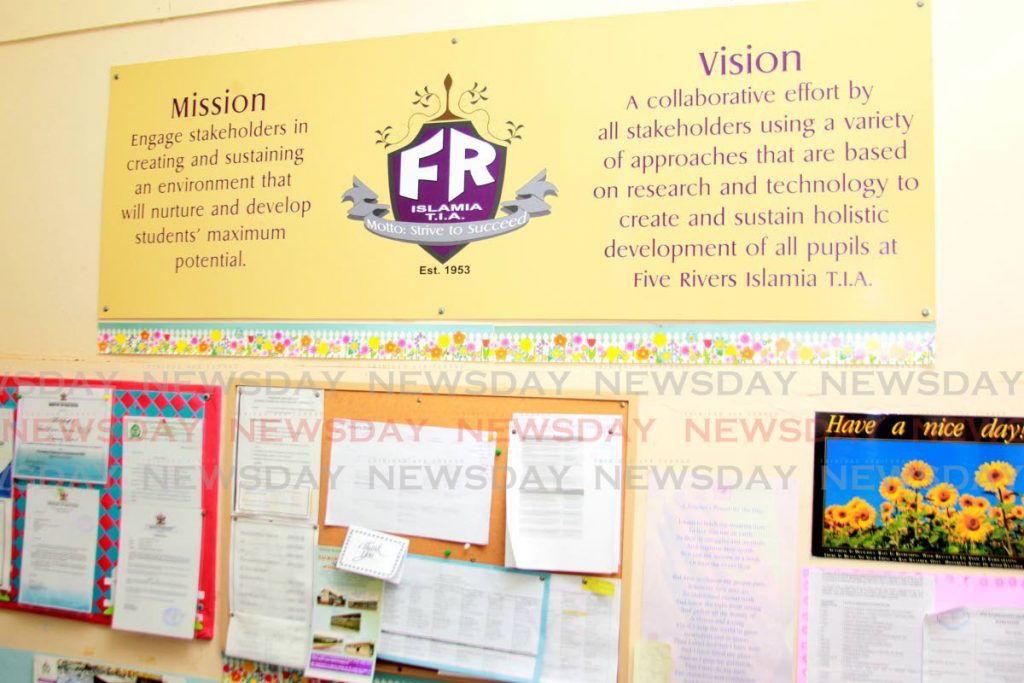Five Rivers TIA School gives online learning an A

While some schools have been struggling with online learning for a variety of reasons, Five Rivers TIA Primary School in Arouca has thrived and is ready for when the new school term begins on Monday.
Principal Saleeka Mohammed-Ali says the system is not perfect but credits the school’s relative success with pennacool.com, an online educational platform, for preparing teachers and students for the transition to online learning, as well as the dedication of her proactive teachers. In addition, for the past several years she instructed teachers to incorporate technology in the delivery of their lessons in at least one session of the term.
“I have to say at pennacool they are really serious about engaging the children with technology and they must be commended for that. So fast forward to covid19. When we discovered online learning would be the new normal, when everybody was griping and complaining and finding all the negative things to say about blended learning, teachers at Five Rivers TIA were already using the technology. So having to be online was nothing new to my teachers or the students.”

She said the school’s relationship with pennacool began in 2018. She noticed it on social media and suggested the staff take advantage of it for standards four and five students to engage in technology and make learning fun.
At that time there was an interschool competition so the children participated in online activities on the school’s computers during part of their lunch hour, as well as at home, and won five tablets for the school. The quizzes are self-correcting so they immediately see if their answers are correct as well as their scores. The children also receive certificates of participation, and prizes.
Mohammed-Ali said it makes the children feel accomplished and motivated, and helped some teachers who were challenged by technology.
Since the teaching material and quizzes are based on the Secondary Entrance Assessment curriculum, her teachers encouraged students to spend at least an hour after school on pennacool as part of their homework.
However, the transition to online learning was not completely smooth.
When students were sent home on March 13, 2020, teachers provided packages with work to occupy them. And they used WhatsApp to communicate with parents and send work for the children for the rest of that term.

“We were able to keep the children in touch with their school work. I convinced my teachers if they don’t make the effort to do it then, whenever the children comes back out the gap is going to be too wide to close in.”
When the new academic term began and the school received guidelines from the Ministry of Education on blended learning, five teachers did not have laptops. So, they used the five tablets the school won from a pennacool inter-school competition in 2018 until they received laptops from the ministry.
Out of 142 children, about 50 did not have devices or internet at home. The school appealed to stakeholders for donations and were able to purchase 21 tablets. They also got tablets from Massy Stores, the ministry, another five from winning a monthly pennacool challenge in February, and Flow, and so were able to assist 41 students with devices.
Also, not all the students had access to the internet. Teachers helped some students to get internet while some parents found ways to get their children access. Now, only about five children cannot access the internet due to various circumstances and so collect physical packages.
They also ensure that, between classes and class exercises, the children do not spend eight hours staring at a screen and prepare timetables with space for physical activities between sessions.
Mohammed-Ali said some children disrupt class, some attend classes late or do not attend at all, but there is participation and the children are progressing. She is also “very satisfied” with the teachers’ online interaction with the children when she conducts clinical supervision.
Franka Ravello, whose ten-year-old son David attends the school, said at first online classes were challenging as her family did not have internet connection at home, nor did he have a device. In March 2020, the teachers sent work via WhatApp so she had to go by a friend, download the instructions on her phone, and return with her son’s schoolwork.

She recalled that David was an A-student up to standard three but at that point his grades started to drop. She discovered he was being called names and the bullying was affecting his performance but, since he started online classes, all his grades improved and he is now eager to work. At the beginning of the new school term in January, she got internet and the school gave him a tablet to use.
“Now, with the Zoom and everything, things are a little better. It’s ok. He’s progressing, and to be honest, I prefer it. He’s more relaxed, more comfortable, he’s doing his work more, and I don’t have to worry about him getting in trouble.”
Ravello added that David has been involved in all the monthly pennacool challenges and has been a top scorer. She said not only is it a form of revision but the word “challenge” makes him competitive, so after he does his offline work he goes on pennacool.com for much longer than the recommended hour. He even does quizzes on topics the teacher has yet to cover by looking at the examples given and asking her to explain, so he is ahead of the curriculum.
The monthly individual prizes including vouchers of internet from Flow, pizza from Marios, and a RightStart account from Republic Bank, also motivates him to keep going.
Standard one student, Mishal Ali, eight, said she too prefers going to school online. While her academic status has not changed and she continues to do well, she likes being able to do her school work on the computer and see her friends through the internet.
Ali’s mother, Karimah, said she preferred having school online as she had less anxiety over her daughter’s interactions with other students.
She said the class projects and exercises are not as fun for her daughter because she does not have other students to compare work with or work on together. So, at the beginning, the friends tried to reach out to each other during class and did not pay attention.

Saleeka Mohammed-Ali. Photos by Roger Jacob -
“Now it’s in my best interest to connect with other parents to have them speak with each other, other than in the class. So now she does WhatsApp calls to her friends, but not about school. They actually play on WhatsApp, setting up video calls and talking while they do different activities.”
Unlike the others, 11-year-old standard four student, Aminah Hosein, said while she likes online school “well enough,” she prefers physical school because she wants to see her friends in person.
She said classes were very different because they can use links, videos, power point, and online quizzes which are easier to work with, “But the rules are stricter online than in physical school. And sometimes children may not actually do it (watch the videos or do the quizzes) and lie, especially on the internet. I can’t wait to go back out to school.”
Mohammed-Ali said 2020 was one of the most challenging in her 42 years in the teaching profession. She became principal of Fiver Rivers in 2012 and expects to retire in February 2022.
“This pandemic taught me faith and resilience which, surprisingly, was not a difficult task. I assumed the duties of plant manager during lock down, managing eight teachers and 142 students virtually.”
She said with the help of her “diligent and dedicated business operating assistant,” she keeps abreast with the “sudden demands from the ministry to meet deadlines” when it comes to repeated submission of information.
“I ask God every morning to protect me and give me the knowledge and wisdom to meet the challenges daily. I am grateful for all of these experiences – from my early days as a skinny teacher, a novice, to the present. I look at my career as service to our children.”

Comments
"Five Rivers TIA School gives online learning an A"